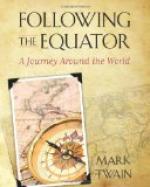It turned out, upon inquiry, to be a pepper tree—an importation from China. It has a silky sheen, soft and rich. I saw some that had long red bunches of currant-like berries ambushed among the foliage. At a distance, in certain lights, they give the tree a pinkish tint and a new charm.
There is an agricultural college eight miles from Horsham. We were driven out to it by its chief. The conveyance was an open wagon; the time, noonday; no wind; the sky without a cloud, the sunshine brilliant —and the mercury at 92 deg. in the shade. In some countries an indolent unsheltered drive of an hour and a half under such conditions would have been a sweltering and prostrating experience; but there was nothing of that in this case. It is a climate that is perfect. There was no sense of heat; indeed, there was no heat; the air was fine and pure and exhilarating; if the drive had lasted half a day I think we should not have felt any discomfort, or grown silent or droopy or tired. Of course, the secret of it was the exceeding dryness of the atmosphere. In that plain 112 deg. in the shade is without doubt no harder upon a man than is 88 or 90 deg. in New York.
The road lay through the middle of an empty space which seemed to me to be a hundred yards wide between the fences. I was not given the width in yards, but only in chains and perches—and furlongs, I think. I would have given a good deal to know what the width was, but I did not pursue the matter. I think it is best to put up with information the way you get it; and seem satisfied with it, and surprised at it, and grateful for it, and say, “My word!” and never let on. It was a wide space; I could tell you how wide, in chains and perches and furlongs and things, but that would not help you any. Those things sound well, but they are shadowy and indefinite, like troy weight and avoirdupois; nobody knows what they mean. When you buy a pound of a drug and the man asks you which you want, troy or avoirdupois, it is best to say “Yes,” and shift the subject.
They said that the wide space dates from the earliest sheep and cattle-raising days. People had to drive their stock long distances —immense journeys—from worn-out places to new ones where were water and fresh pasturage; and this wide space had to be left in grass and unfenced, or the stock would have starved to death in the transit.
On the way we saw the usual birds—the beautiful little green parrots, the magpie, and some others; and also the slender native bird of modest plumage and the eternally-forgettable name—the bird that is the smartest among birds, and can give a parrot 30 to 1 in the game and then talk him to death. I cannot recall that bird’s name. I think it begins with M. I wish it began with G. or something that a person can remember.




